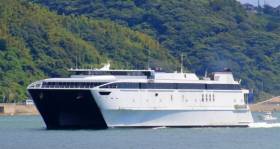Displaying items by tag: Delivery Dublin Debut
#FerryNews - Irish Ferries soon to be introduced high-speed-craft Dublin Swift which since January has been in Belfast for a major refurbishment arrived in Dublin Port last night, writes Jehan Ashmore.
Afloat monitored Dublin Swift when offshore of Co. Down late yesterday afternoon and at time of writing, the HSC catamaran is docked in Dublin Port at the ferryport's berth 51A. This berth is where the current HSC, Jonathan Swift maintains operations on the core Dublin-Holyhead route until as previously reported is to be disposed later this month.
A year ago this month Irish Continental Group (ICG) parent company of Irish Ferries acquired the HSC for $13.25 million. The HSC was placed on an external-charter by ICG for use by the US Military Sealift Command.
On completion of the charter, the HSC arrived to Belfast this day three months ago and would later receive conversion works in Harland & Wolff's Belfast Dry Dock. This was followed by a refurbishment programme to bring the craft up to Irish Ferries standards. The works also took place at H&W's Ship Repair Quay adjacent to the dry-dock.
In 2001, Westpac Express was built by Austal Ships Pty, Fremantle, western Australia, to their in-house 101m Auto-Express design. The HSC has a gross tonnage of 8,403, passenger capacity for 900 and vehicle space for 182.
Dublin Swift will bring increased capacity on the core Ireland-Wales route in partnership with flagship cruiseferry Ulysses. Likewise of the flagship, the Cypriot flagged HSC will join operations on the core Ireland-Wales link with the chartered-in ropax Epsilon providing more freight-orientated capacity.
For almost two decades Jonathan Swift has served the route. The HSC was custom-built for ICG and marketed by Irish Ferries as the 'Dublin Swift' (see: related story). On introduction of this 'second' Swift, this will led to a delivery voyage of the older HSC to Spanish operators to begin a career in the Mediterranean. This is understood to involve a Spain-Belearic service.
Returning to Belfast is where a recent arrival to the Ship Repair Quay, Azamara Pursuit is in port for a major multi-million pound refurbishment. The cruiseship which operates for Azamara Club Cruises, a brand of Royal Caribbean International, contracted Newry-based fitout specialists MJM Group for the project.
The 30,000 tonnes cruiseship had served a career with P&O Cruises with calls to Irish ports among them Cobh and followed by a short-lived service in Cuban waters.





























































